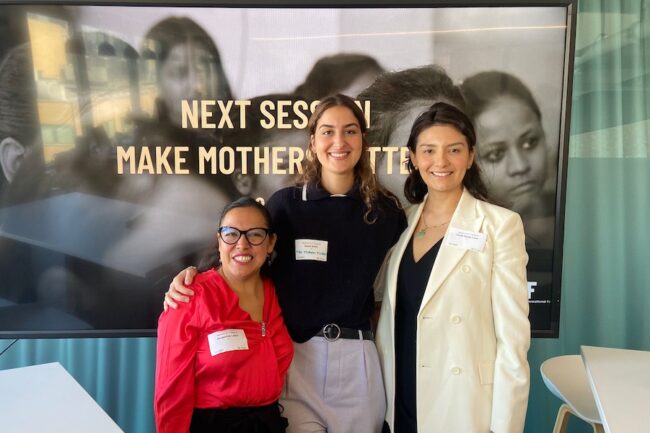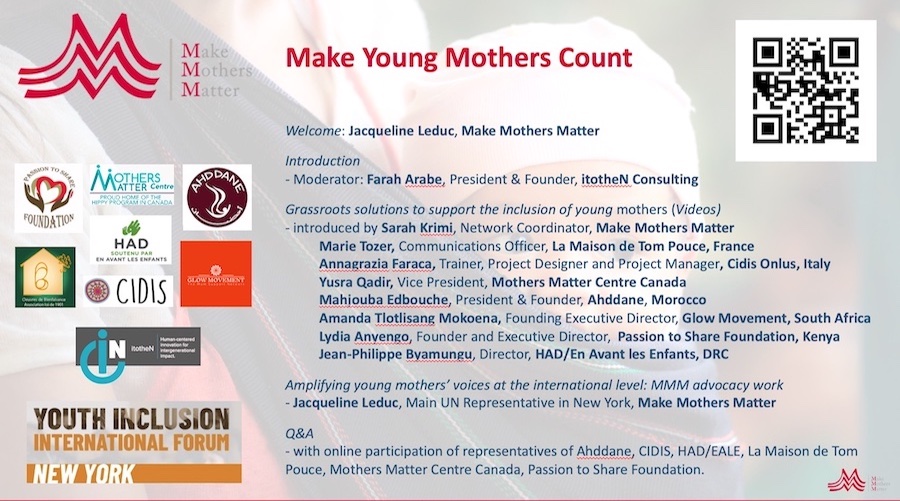Our members highlight why and how young mothers must be counted
24.10.23
A look back at our LP4Y event in New York

We partnered with Life Project 4 Youth (LP4Y) on their 1st Youth Inclusion International Forum in New York recently, to address the topic of young mothers and how their societal inclusion must be a priority.
Make Young Mothers Count brought together some of our grass roots members from around the world to give us an insight into their work for young mothers. Our session’s main objective was to show through concrete examples, how young mothers, especially lone young mothers, are all too often excluded from society and the economy, and how their inclusion is possible and can be a trigger for positive change.
Through pre-recorded videos, our members demonstrated how globally, teenage girls or very young women give birth to children not always planned, or whose partners have shirked their responsibilities. Sometimes, their pregnancy is the result of rape… they then become young lone mothers, a status that all too often makes them outcasts in their own community and society.
In addition to stigmatisation and exclusion from society, the challenges of raising children alone, and the barriers to accessing decent work, leaves young lone mothers and their children all too often over-represented among the poorest, with dire consequences for the future of those children.
Our member associations have implemented programs and solutions to support these young mothers, which may be considered as examples of best practices and transposed to other places and/or scaled-up.
Their actions demonstrate that when these mothers are taken into account and receive adequate support, they represent an important economic force for development, that of their children and their community – a fact which is at the heart of MMM’s international advocacy work.
We heard from Marie Tozer, Communication Officer at La Maison de Tom Pouce, a French organization that offers shelter and support around birth for young mothers who are homeless and are often non-documented migrants.
Yusra Qadir, Vice President Mothers Matter Centre Canada continued with the migrant theme by explaining how they work with isolated and at-risk mothers, often from migrant backgrounds, by helping them gain new skills and abilities essential to strengthening mother-child relationships.
Mahjouba Edbouche, Founder & president AHDANNE, Morocco spoke about their work with young lone mothers who are social outcasts, by offering them emotional support, legal counselling, childcare services and mother and child shelters.
Amanda Tlotlisang Mokoena, Founding Executive Director Glow Movement, South Africa explained how they empower and support young mothers in South Africa through unique programs and workshops.
Lydia Anyango, Founder and Executive Director Passion to Share Foundation, Kenya – and Kokomelon Daycare/Nursery School, Kenya told the audience how they are empowering young mothers in Africa’s biggest slum the Kibera through training and childcare services.
Jean-Philippe Byamungu, Director HAD / En Avant les Enfants, DRC talked about the training and empowering tools they offer to young single mothers in the agricultural sector, restoring their dignity and autonomy thereby reinstating their position in the community and providing for their children and community at large through this activity.
Our moderator Farah Arabe, Founder, itotheN Consulting & Co-President, Harvard Kennedy School Women’s Network was joined by our organizing team Jacqueline Leduc, Main UN Representative in New York, and our Network Coordinator Sarah Krimi.

The New EU Gender Equality Roadmap : A Call for Inclusion of Mothers
04.03.25
The European Commission’s initiative on a new Gender Equality Roadmap post-2025, marks a significant step forward in addressing gender disparities across the European Union. Make Mothers Matter (MMM
Breaking the Cycle: Gender Equality as a Path to Better Mental Health
18.03.25
The Council of the European Union has taken a decisive step in recognising the vital connection between gender equality and mental health.
Europe Must Listen to Mothers: Our landmark report heads to the European Parliament
28.08.25
On 22 September 2025, the voices of mothers will take centre stage in Brussels. For the first time, Make Mothers Matter (MMM) will present its State of Motherhood in Europe








